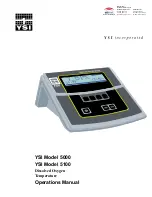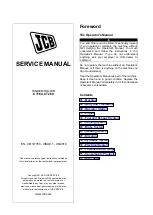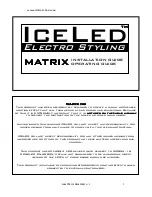
-11-
2b) Seal the end of the connecting tube with the finger (picture 3).
2c) Inflate with the hand inflation bulb to 40 cmH
2
O; the value must be constant for
2 - 3 sec.; in case of a pressure decrease, the connecting tube is leaking and
must be replaced. Check again with the new connecting tube (repeat steps
2a-2c).
During connection and disconnection of the connecting tube, do not bend the
luer fitting of the device, to prevent damage. Furthermore, make sure that the
connecting tube is held on the connector (not at the tubing).
If the vacuum valve is used, do the following test prior to use:
3a) Inflate the low pressure cuff of a tracheal tube with the Cuff Pressure Gauge to
40 cmH
2
O (picture 4).
3b) Attach the inflation line to the Luer nozzle of the red vacuum valve (picture 5,
6).
3c) Squeeze the inflation bulb several times; the low pressure cuff has to deflate.
3d) Squeeze the inflation bulb until it does not return to its original position; the low
pressure cuff must be completely empty now (picture 6).
3e) Disconnect the inflation line from the vacuum valve. Connect the inflation line
to the Luer nozzle of the Cuff Pressure Gauge. The needle of the Cuff Pres
-
sure Gauge has to show a negative pressure by moving counter-clockwise
(picture 7).
INSTRUCTIoN FoR USE wITh TRAChEAL TUbES wITh hIGh-VoLUME
Low-PRESSURE CUFF
Before use check the low pressure cuff for leaks. Prior to intubation or extubation
withdraw all air from the cuff via a syringe or the vacuum valve. Connect the Cuff
Pressure Gauge (eventually by using the connecting tube) to the inflation line of
the tracheal tube. Inflate the cuff to a pressure of 60 - 90 cmH
2
O. This ensures
that the cuff is in close contact with the tracheal wall. Release the pressure imme
-
diately by pressing the red release valve until the pointer reaches the green area
“Tracheal Tubes”. We recommend the intra cuff pressure to be above 22 cmH
2
O
due to the risk of aspiration or pneumonia and below 32 cmH
2
O due to the risk
of ischemia of the tracheal mucous membrane (see publication of J. Stauffer in
Respiratory Care, July 1999).
Check and monitor the cuff pressure continuously. Adjust pressure increase via
the red release valve and pressure decrease via the inflation bulb.
INSTRUCTIoN FoR USE wITh LARyNGEAL TUbES
Before use check both cuffs for leaks. Prior to intubation or extubation withdraw
all air from the cuff via a syringe or the vacuum valve. Connect the Cuff Pressure
Gauge (eventually by using the connecting tube) to the inflation line of the tube.
We recommend a cuff pressure of maximum 60 cmH
2
O for laryngeal tubes. Due to
the high-volume low-pressure cuffs, a seal can already be achieved with low cuff
pressures (light green area).
Check and monitor the cuff pressure continuously. Adjust pressure increase via
Summary of Contents for UNIVERSAL
Page 2: ......
Page 4: ...Luer nozzle 1 2 Tube connector 3 Inflation line 4 Luer nozzle of vacuum valve 5 ...
Page 5: ...6 7 ...












































